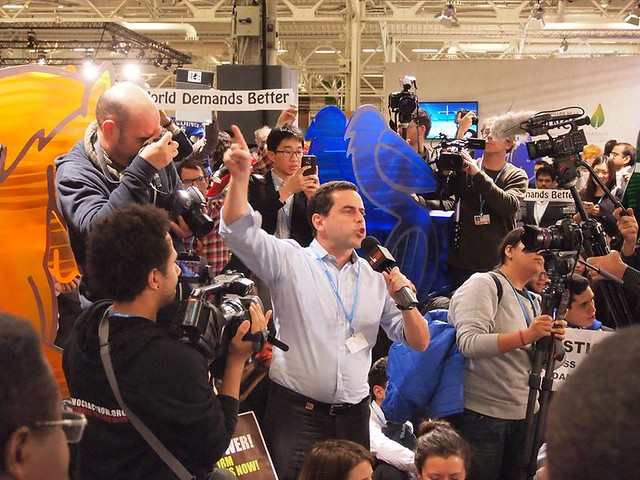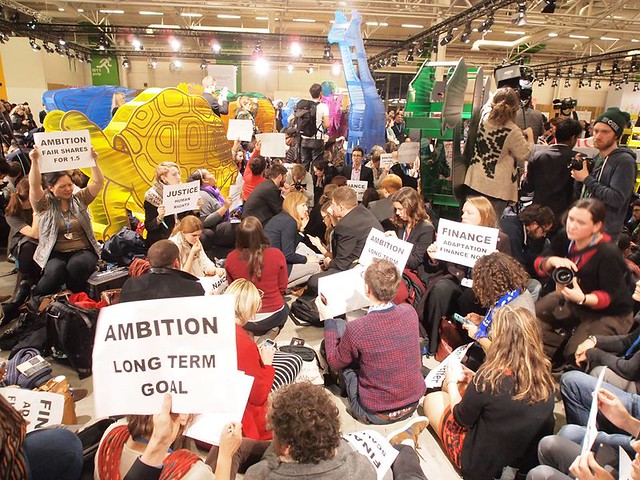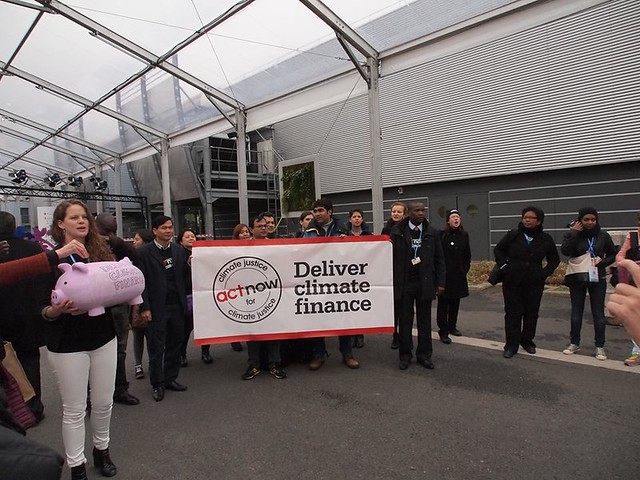距離COP21巴黎氣候大會結束只剩兩天,最新的氣候協議草案版本於9日下午發佈,引發數百位公民團體在會場內抗議,主張談判代表們目前提出的版本是「弱化的氣候協議」,內容並不符合公平正義的原則。
國際地球之友(Friends of the Earth)氣候正義與能源專員Sara Shaw說:「各國政府不該定案於這個版本。位於氣候變遷第一線的人們,也就是身歷氣候變遷苦果的人們,要求富裕國家公平分攤減排配額,並提供南方國家必要的資金與能源轉型協助。協議草案對不起這些氣候前線的社群。」
「今日的草案在企圖心、差異化、平等、資金和損失等關鍵議題上都沒有進展。許多最重要的問題仍然未定。」他補充說。
世界自然基金會(WWF)巴黎氣候談判代表領袖Tasneem Essop態度較樂觀:「談判結果仍有可能產生具有企圖心的結果。不過談判人員們尚未做出最困難的決定。只剩下兩天可以決定我們是要暖化1.5°C還是3°C。」
「目前的草案納入更多選項,以便讓所有國家在2020年以前重回談判桌,強化減碳承諾。也就是說,各國必須防堵現存的漏洞,確保2020年前的檢討與改善機制完備,涵蓋適應、資金和減排,不讓任何國家脫鉤。」Essop說。
綠色和平氣候政策顧問Kaisa Kosonen對目前草案雖有批評,但認為仍有機會達成更有力的最終協議。
「正面之處是1.5°C的目標仍然是選項之一,問題是各國的減排目標貧弱,也甚少著墨如何要求各國盡快回頭檢視,強化他們的目標。」「更糟的是關於零碳排的期限,目前的草案文字軟弱無力,沒有將2050年定為具體期限,沒有期限就沒有實質作用。」Kosonen說。
連緩解海洋災難的措施都沒有
氣候警戒研究所(Climate Emergency Institute)成員Peter Carter認為,儘管政府間氣候變化專門委員會(IPCC)第五次評估報告中海洋佔有不少版面,而且美國和歐洲當局要求聯合國氣候祕書處在協議內加入海洋相關內容,目前的草案並沒有做到。
「協議內容中連緩解海洋災難的措施都沒有。溫室氣體汙染海洋的程度非常嚴重,已經是全地球等級的緊急事件。」Carter說。
Carter強調,地球升溫讓海洋隨之不可逆地暖化、酸化和含氧量減少,將持續1000多年。他希望在協議中訂出大氣二氧化碳和其他氣體濃度的安全限制,並稱之為1992年氣候變化框架公約安全要求指標。Carter認為這對海洋暖化和酸化具有重大意義。
草案中第一次提到海洋是在前言中,但是前言不具法律約束力。接著是在加強「碳匯」(greenhouse gas sink)以改善二氧化碳吸收、加強生態系統健康的段落,但是文字模糊,可以被解釋為沿岸與海洋生態系,也可以被解釋為陸地生態系。
全球海洋信託(Global Ocean Trust)氣候財務專家Torsten Thiele說:「我認為可以樂觀看待這份草案。其中有包含海洋的元素,也在前言中象徵性出現。這是好消息,但是必須鼓勵談判者繼續形成更具雄心、也沒有『括號』的協議。」
他認為,協議應該明定碳排高峰年,為緩解海洋衝擊設立立即的時限。
移除化石燃料補貼 未納入
Carter和其他批評者警告,雖然銀行首長和化石燃料公司等許多大企業呼籲將碳價納入協議內容,但碳價並未包含在草案中。
最後,儘管停止化石燃料補貼是全球性的共識,包含在今年6月的G7會議上亦是如此,草案中並沒有停止化石燃料補貼的內容,批評者們對此感到大為失望。
With just two days to go before the United Nations COP21 climate talks in Paris are scheduled to conclude, it's crunch time for the negotiating ministers.
The latest version of the draft outcome text released today outlines the choices still on the table.
Today, after negotiators tabled what they called a “weak draft climate deal,” hundreds of civil society demonstrators staged a noisy protest inside the conference venue to say that politicians are “failing to provide a fair and just climate deal in Paris.”
Friends of the Earth International climate justice and energy coordinator Sara Shaw said, “Our governments must not settle for the draft text as it stands. People on the frontline of climate change, who are already suffering as a result of climate change, demand that rich countries to do their fair share of emissions reductions and provide necessary finance for an energy transformation in Southern countries. The draft deal fails these frontline communities.”
“Today's text shows no progress on crucial issues, including ambition, differentiation, equity, finance, loss and damage. Many of the most important issues remain in brackets,” said Shaw.
Tasneem Essop, WWF's head of delegation to the UN climate talks in Paris, was more optimistic, saying, “We still have the ingredients for an ambitious outcome in Paris.”
“But they still haven't taken the hard decisions yet. Ministers now have just two days to decide to either put us on a path that will limit us to 1.5°Celsius of warming, or towards a 3°Celsius world,” said Essop.
“The text now includes more options to have all nations come back to the table by 2020 to improve their current pledges,” said Essop. “That said, they'll need to close existing loopholes to make sure any pre-2020 review and ratcheting up mechanism is comprehensive – covering adaptation, finance, and emissions reductions – and does not let some countries off the hook.”
Greenpeace Climate Policy Advisor Kaisa Kosonen is critical of the draft text but still hopeful that a stronger final deal can be reached.
“It's good that a temperature goal of 1.5 degrees C is still there. It's bad that countries' emissions targets are so weak and there's very little in the text that makes them come back soon with something better,” she said.
“But worst is the deadline for phasing out carbon emissions,” Kosonen said. “Right now this draft deal contains wishy-washy language instead of setting a tight deadline of 2050. Without a date it won't have weight.”
Peter Carter of the Climate Emergency Institute is concerned that “the oceans have not survived the negotiations.”
This is despite “the excellent ocean coverage” by IPCC's Fifth Assessment Report, and requests to the UN Climate Secretariat by U.S. and EU ocean agencies to include oceans in the agreement.
“Even measures that could mitigate the disastrous ocean situation are not in the agreement,” warned Carter. “The atmospheric greenhouse gas pollution situation for the oceans is dire – without doubt a planetary emergency.”
Carter stresses that as the planetary temperature rises the oceans will suffer impacts such as irreversible heating, acidification, and de-oxygenation lasting 1,000s of years.
He wants to see in the agreement atmospheric carbon dioxide and other gas concentration safety limits. Carter calls this the safety requirement metric of the 1992 UNFCCC, impacting ocean heating and acidification.
The text mentions the ocean for the first time in the preamble to the agreement, but the preamble is not legally binding.
Later paragraphs refer to the need to enhance greenhouse gas sinks to help absorb CO2 emissions, and to foster ecosystem integrity, vague wording that can be taken to refer to coastal and ocean ecosystems as well as land-based ones.
Climate finance expert Torsten Thiele, of the Global Ocean Trust, said, “I see this draft as a case of the glass is half full. We got ocean in the substance and also symbolically in the preamble of the draft. This is good news but we need to encourage the negotiators to continue to work to get to an ambitious agreement without the brackets.”
The agreement should state a specified year for emissions to peak, an immediate time frame for mitigation of multiple catastrophic impacts on oceans, ocean campaigners demand.
Carter and other critics warn that carbon pricing is not included in the draft text despite calls to include it this year from most of the largest corporations, including the chief executive officers of banks and fossil fuel corporations.
And finally, critics are disappointed that the draft does not call a halt to fossil fuel subsidies despite a universal call for termination, including at the G7 meeting of the world's industrialized nations in June 2015.
※ 全文及圖片詳見:ENS







